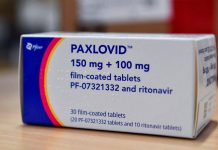Also called beta-adrenergic blocking agents, beta blockers are used to treat high blood pressure (hypertension), abnormal heart rhythms (arrhythmias), heart failure, angina (chest pain), among others.
The drugs block neurotransmitters norepinephrine and epinephrine (adrenaline) from binding to beta receptors on nerves in order to lower blood pressure and reduce heart rate, Beta blockers also control blood pressure by dilating the blood vessels.
They have also been found to prevent heart attacks and death from a heart attack. Other indications of beta blockers include hyperthyroidism, akathisia (restlessness or inability to sit still), panic disorder, anxiety, and aggressive behavior, according to Medicine Net.
Some beta blockers are used in the form of ophthalmic locution to reduce the production of aqueous humor in the eye, lowering ophthalmic pressure in patients with glaucoma. For example, timolol ophthalmic solution is a beta blocker used for the treatment of increased intraocular pressure.
Common examples of generic drugs for beta blockers include:
- Atenolol
- Acebutolol
- Betaxolol
- Bisoprolol fumarate
- Carvedilol
- Esmolol
- Metoprolol
- Nadolol
- Nebivolol (Bystolic)
- Propranolol
Some of the common side effects of beta blockers include nausea, vomiting, abdominal cramps, diarrhea, and weight gain. One may also experience side effects such as blurry vision, insomnia, hair loss, and disorientation.
Beta blockers may adversely interact with certain drugs, such as chlorpromazine, clonidine, phenobarbital, non-steroidal anti-inflammatory drugs (NSAIDs), and diabetes drugs, including insulin.
In the United States, acebutolol, atenolol, bisoprolol, metoprolol, nadolol, and timolol are available in generic versions, which are 80 to 85% cheaper than their brand-name counterparts. Check with your doctor if you want to switch to a generic beta blocker from a brand-name version.
Word of Caution
Doctors do not prescribe beta blockers to people who have a history of asthma, chronic obstructive pulmonary disease (COPD), low blood pressure (hypotension), a slow pulse (bradycardia), and a type of heart rhythm problem known as a heart block. Beta blockers can hide signs of low blood sugar, according to WebMD, so you will have to check your blood sugar more often if you are diabetic. The drugs are unsafe for pregnant women and nursing mothers.























